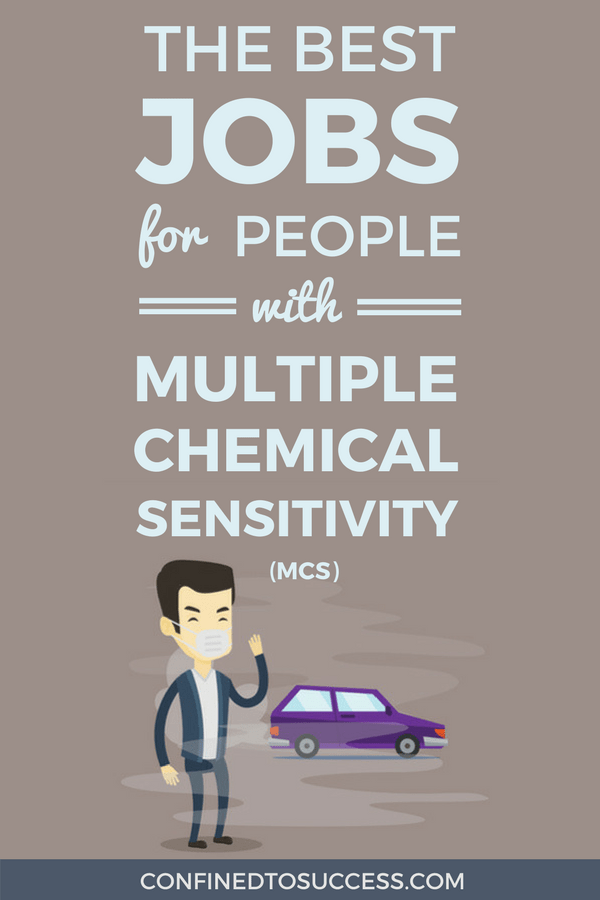Best Jobs For People With MCS (And Jobs To Run Away From!)

Are there certain chemicals or environments that trigger terrible symptoms in your body like headaches, dizziness, and nausea? Do doctors not know what to do with you? If so, you may be suffering from multiple chemical sensitivity, also known as MCS.
MCS can be very constricting to the point that it starts to affect all aspects of your life, including work. So how can you continue to earn a living when it seems like everything makes you feel sick? In this post, you’ll discover some of the best jobs for people with MCS to help get you around this issue, along with tips on how to make your work-life more manageable, given your limitations.
So, let’s get going!
WHAT IS MULTIPLE CHEMICAL SENSITIVITY?
There’s a great deal of debate among doctors whether multiple chemical sensitivity is even a disease, including those associated with the American Medical Association. [source] But as an MCS sufferer, I’m sure you’d be the first to disagree with these experts, given how awful you probably feel!
Typical MCS symptoms include headaches, nausea, dizziness, rashes, sneezing, and unexplained tiredness. These symptoms are set off by exposure to high amounts of certain chemicals, most of which we encounter in everyday life such as cleaning products, perfumes, car exhaust, gasoline, and air fresheners, as well as more uncommon sources like printing paper from copy machines.
MCS symptoms may come on quickly and send you off to bed for the rest of the day, much like an allergic attack would. But for some people, exposure to certain irritants can cause more serious problems and even mimic life-threatening issues like heart palpitations, restricted breathing, and constricted throats.
An MCS diagnosis is made when the problem appears chronic, where exposure to specific substances automatically trigger symptoms which then resolve once removed. [source] But even with a diagnosis, MCS is difficult, if not impossible, to treat since it has no known cause.
WORST WORK CONDITIONS FOR PEOPLE WITH MCS
As mentioned, multiple chemical sensitivity can affect every area of your life, from housing to social interactions. But when it starts to affect employment, you really have a problem since the prospect of having little to no money means a lower quality of life all-around.
To avoid this prospect, you’ll want to stay away from jobs that require you to handle chemicals, pollutants or toxins directly. Depending on your specific triggers, these could be:
- Cleaning products
- Paints
- Pesticides and herbicides
- Gasoline and oil
- Candles and fragrances
- Soaps
- Laundry detergents
You’ll also need to beware of environmental triggers that could be a part of your workspace, including:
- New carpets and furniture
- Newly remodeled spaces
- Spaces with mold and mildew
- Spaces with radon or asbestos
Moreover, jobs that force you to be in close proximity to others may also trigger symptoms since you’d likely be surrounded by co-workers who use common personal care and grooming products like soap, shampoo, hair styling gel, lotion, laundry detergent, and perfume.
Given these unfavorable work conditions, which specific jobs should you try to avoid?…
WORST JOBS FOR PEOPLE WITH MCS
- Housekeeping – This line of work requires you to work with all sorts of chemicals, most of which probably won’t be naturally-based. Frequent exposure to skin and fumes can exacerbate symptoms significantly.
- Landscaping – Most landscapers work with pesticides and/or herbicides, both common MCS triggers. They also work with fertilizers and use equipment that run on gas or diesel, creating toxic fumes which may trigger symptoms.
- Hospital work – While hospitals are known for their cleanliness, the chemicals used to limit patients’ exposure to bacteria and viruses may adversely affect you. Thus, any career requiring you to work in this environment like doctors, nurses, or medical technicians should be passed on.
- Education – If common household products like soaps, detergents, and fragrances trigger symptoms, avoid classroom environments since you’d likely encounter dozens of students and faculty all day long. You’d also have regular exposure to common work materials like chalk, markers, and glue.
- Chemical engineering – By developing and manufacturing chemicals used in the food, drug and fuel industries, you’d be directly exposed to toxins.
HOW TO COPE WITH MCS IN THE WORKPLACE
Obviously, your goal is to get through the workday symptom-free but finding a completely sterile, trigger-free zone isn’t likely with such a vast array of toxins around like hand lotions and printing paper. Still, it’s possible to manage your symptoms and improve your workspace with the following tips:
Ventilate frequently – Many toxin-triggers can be eliminated through proper ventilation by opening an office window or running a fan nearby. A personal air purification system to remove scents and pollutants from the air can also help if you’re nowhere near a window.
Work from home part-time – More and more offices have started to allow their employees to work from home, at least part of the time. [source] At a minimum, try to negotiate one or two days per week away from the office with your employer.
Use mobile meetings – Try to attend meetings via conference calls, video conferencing, and group documents to stay abreast of the goings-on in the office if you feel the need to stay away from co-workers.
Request revision of company policy – While a long shot, talk to your employer about creating new office policies to accommodate your needs and increase productivity. If your requests aren’t too intrusive on other employees, he/she might be open to the idea.
BEST WORK CONDITIONS FOR PEOPLE WITH MCS
MCS sufferers have many different triggers, which makes it difficult to identify work environments suitable for everyone. That said, here some general recommendations:
- Good ventilation – Ideally, you want to be able to work by yourself without being near or in the same room as your co-workers. You should be close to open windows and the office should have an excellent ventilation system.
- Fragrance-free environment – Many employers have started instituting fragrance-free policies to benefit their employees and customers.
- Right Building – The office building should be new enough so that it’s free from harmful chemicals like asbestos and lead, but old enough so that odors typical of new or remodeled buildings have dissipated.
- Understanding Employer – Your employer should pledge a safe workspace and be open to the idea of telecommuting. Moreover, he/she should understand your situation and allow you time to recuperate at home, if needed.
So, which jobs best match these optimal conditions for the MCS sufferer?…
BEST JOBS FOR PEOPLE WITH MCS
- Office work – Many office jobs allow you to work by yourself in your own office or, at the very least, cubicle. You’ll be better able to control what you come into contact with and rarely encounter overt chemicals. A couple office positions that meet this requirement include accountant and statistician.
- Information technology – Oftentimes, you can work on your own as an IT specialist and avoid chemical exposure (apart from the office building itself). Possible careers include web designer, web developer, software programmer, and network specialist.
- Graphic design – Do you enjoy designing pictures, fonts or signs? If so, graphic design could be the right job for you. While it’s primarily computer-oriented work, you may also need to draw by hand. In most cases, toxin-free instruments are available.
- Medical transcriptionist – As a medical transcriptionist, you mainly work by yourself, using only a telephone and computer. Your primary job role is to listen to doctors’ dictations and type them up for health care professionals to read.
- At-home work – An increasing number of jobs have moved into this sector so you’d be in good company if you decide to go this route. [source] More importantly, you’d get to create the perfect work environment at home, free from symptom-inducing toxins!
As you’d imagine, there are countless ways to make money from home, including advertising, customer service, sales, freelance writing, e-commerce, and survey taking, among many other methods.
But above all, my favorite work from home strategy is affiliate marketing, a business model where you make money by marketing different companies’ products and services via a website like this one.
CONCLUSION
While multiple chemical sensitivity certainly presents problems in the workspace, it doesn’t mean you have to stay in a controlled environment at all times. By finding jobs that limit your exposure to symptom-inducing chemicals like those suggested or creating your own chemical-free environment at home, you still can build a career that gives you both joy and freedom.
NOW IT’S YOUR TURN!
As an MCS sufferer, what tips do you have for creating a chemical-free workplace? Can you think of any other MCS-friendly jobs? Leave your comments below!








